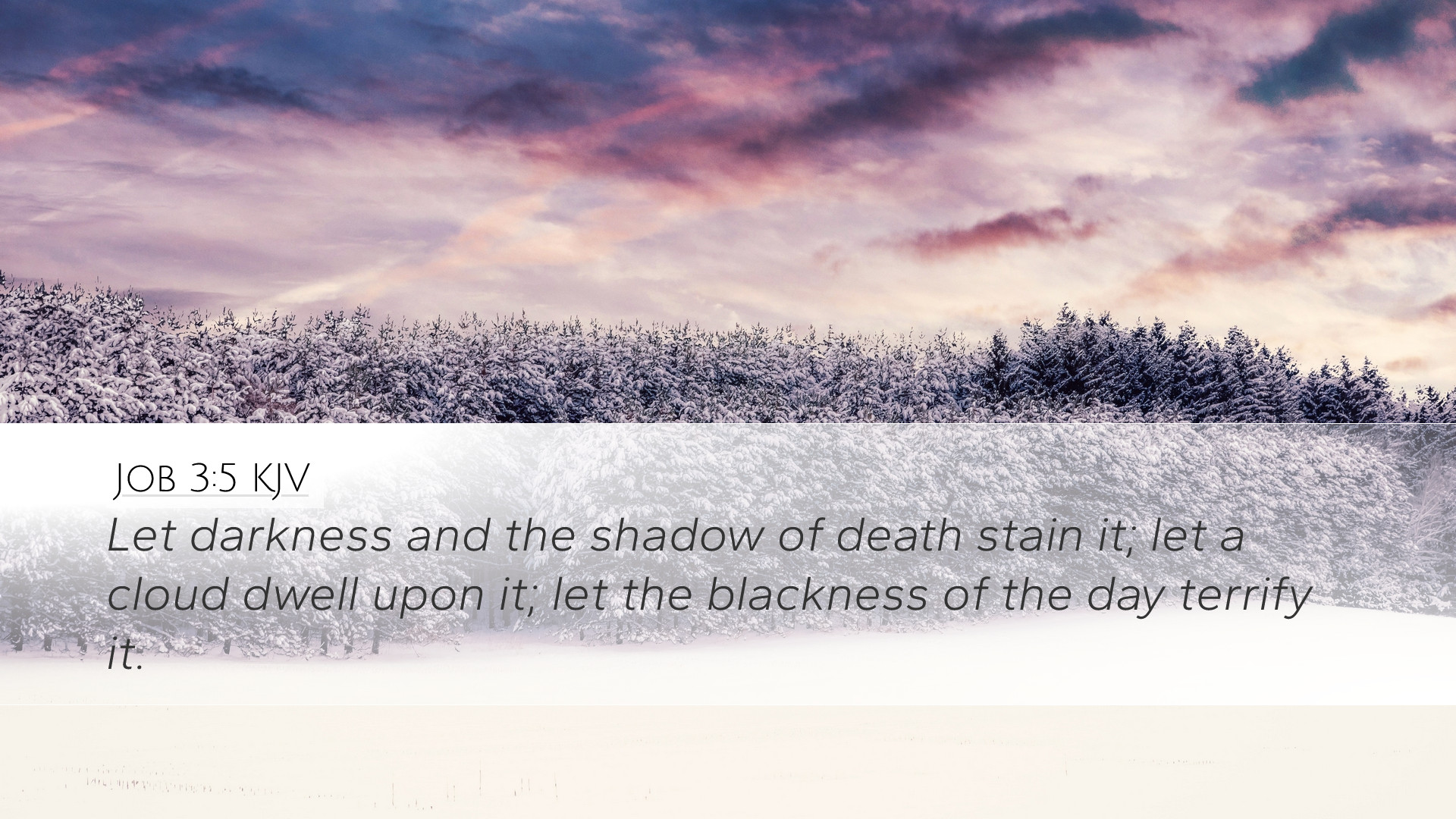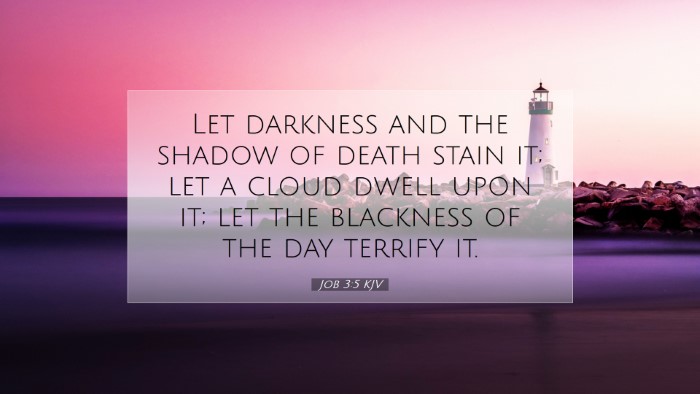Old Testament
Genesis Exodus Leviticus Numbers Deuteronomy Joshua Judges Ruth 1 Samuel 2 Samuel 1 Kings 2 Kings 1 Chronicles 2 Chronicles Ezra Nehemiah Esther Job Psalms Proverbs Ecclesiastes Song of Solomon Isaiah Jeremiah Lamentations Ezekiel Daniel Hosea Joel Amos Obadiah Jonah Micah Nahum Habakkuk Zephaniah Haggai Zechariah MalachiJob 3:5
Job 3:5 KJV
Let darkness and the shadow of death stain it; let a cloud dwell upon it; let the blackness of the day terrify it.
Job 3:5 Bible Commentary
Commentary on Job 3:5
Job 3:5 (KJV): "Let darkness and the shadow of death stain it; let a cloud dwell upon it; let the blackness of the day terrify it."
Overview
Job 3:5 is part of one of the most poignant and profound passages in the Book of Job, where Job expresses his anguish over his birth. This verse particularly highlights Job's desire for darkness to envelop his day of birth, showcasing his deep despair and the extreme emotional and spiritual turmoil he is experiencing. The commentaries of esteemed theologians such as Matthew Henry, Albert Barnes, and Adam Clarke provide insights into both the literary structure and theological implications of this verse.
Insights from Matthew Henry
Henry emphasizes the intensity of Job's grief and how it manifests in his view of his birth. He interprets Job's wish for darkness in several ways:
- Condemnation of His Birth: Henry notes that Job’s strong words reflect his desire for the day of his birth to be utterly erased from existence. The darkness symbolizes his desire to nullify not only his existence but also the suffering it has brought.
- Symbol of Mourning: The imagery of darkness aligns with mourning traditions, where darkness is a metaphor for death and sorrow. Job's lamentation reveals the deep psychological pain that accompanies great loss and suffering.
- Spiritual Blindness: The darkness also represents a kind of spiritual blindness, where hope and light are absent from Job's situation. This serves as a profound commentary on the struggle between faith and despair.
Understanding from Albert Barnes
The commentary provided by Barnes expands on the metaphoric interpretations of darkness in this verse:
- Darkness as Desolation: Barnes contends that darkness in Job's proclamation symbolizes desolation and the absence of light (hope). It emphasizes Job's perception of his life as void of purpose and joy.
- Themes of Death and Mourning: Barnes additionally highlights how Job invokes the "shadow of death," connecting his current suffering with inevitable mortality. This allusion is indicative of the human condition—an overwhelming confrontation with suffering and eventual death.
- Clouds and Spiritual Struggle: The mention of clouds suggests that Job experiences an oppressive weight over him, reflecting his continuous struggle against his affliction. It depicts the heaviness of his heart burdened with despair.
Adam Clarke’s Perspective
Clarke offers a unique view rooted in the literary aspects of the verse:
- Poetic Structure: Clarke points out the poetic nature of Job’s expressions and how they serve to emphasize his emotional state. The use of vivid imagery in "darkness" and "cloud" reflects a deeply artistic lament that transcends mere words and seeks to capture the visceral pain of agony.
- Existential Implications: Clarke’s analysis digs into the existential weight of Job’s cry, indicating a conflict with the nature of existence itself. Job questions the value of life against the backdrop of his suffering, ultimately challenging readers to ponder the purpose of life amid tragedy.
- Theological Reflections: He also reflects on how this verse brings out theological debates on human suffering and divine justice. Job's yearning for darkness can prompt scholars and theologians to examine the broader implications of suffering in the human experience and the nature of God’s governance over it.
Thematic Reflections
As we consider Job 3:5, several themes arise that are critical for theological reflection:
- Human Suffering: Job’s emotional response epitomizes the human experience of suffering. It brings to the forefront questions about the nature of suffering, the role of God in human affairs, and the seeming silence of God in times of distress.
- Hope and Despair: The juxtaposition of hope versus despair is palpable in Job’s lament. While he wishes for darkness, deep within this expression lies an implicit yearning for light, illustrating the oscillation between hope and hopelessness.
- The Role of Pain in Faith: The verse underscores the necessity to grapple with pain as part of the spiritual journey. Job's lament challenges us to confront and articulate our own darkness within faith’s framework.
Conclusion
Job 3:5 serves as both a lament and a profound inquiry into the nature of human existence. The combined insights of Matthew Henry, Albert Barnes, and Adam Clarke provide a rich tapestry of understanding surrounding the verse. For pastors, students, theologians, and biblical scholars, it invites an exploration of anguish, hope, and the overarching question of divine presence in times of suffering. Learning from Job’s emotional depth can inspire believers to embrace their own struggles within the journey of faith.


